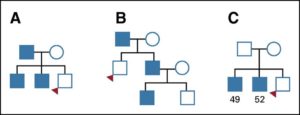Prostate cancer is mostly a random event for middle aged or elderly men. Some men have an unusual risk by virtue of a strongly positive family history. Some are born with a genetic mutation in all their cells such as the BRCA 1 or 2 mutation or Lynch Syndrome, both of which convey an increased risk of many types of cancer. How important these are in adding to risk has been variously estimated to convey about a 2 to 4 fold increase risk of getting the disease. Against this background comes an important study from Utah. The State of Utah has been collecting data on its residents since the 1780’s. 11 million people are in their database. In a recent paper in the Journal of Clincial Oncology, a group of physician investigators looked at this database to assess which men were at highest risk. Some of the data was incomplete but an amazing amount of information was gleaned. Click here for the link. Dr. Stark can send you the complete article. In essence having a strongly positive family history was more important than being born with a genetic mutation. The strongest adverse family history was coined “hereditary prostatc cancer” by the authors. The figure here gives examples of what was required to be called that — basically three family members over three generations, or two family members who got it at an early age. Their risk of getting the disease at or before age 55 was eight-fold higher than average. The risk of getting the disease while young was much less for the BRCA or Lynchmutations. The takeaway: while current guidelines don’t call for screening before age 50, men with strong family histories should consider starting screening at a much younger age — perhaps 40. Don’t wait for the guidelines to catch up.
over three generations, or two family members who got it at an early age. Their risk of getting the disease at or before age 55 was eight-fold higher than average. The risk of getting the disease while young was much less for the BRCA or Lynchmutations. The takeaway: while current guidelines don’t call for screening before age 50, men with strong family histories should consider starting screening at a much younger age — perhaps 40. Don’t wait for the guidelines to catch up.